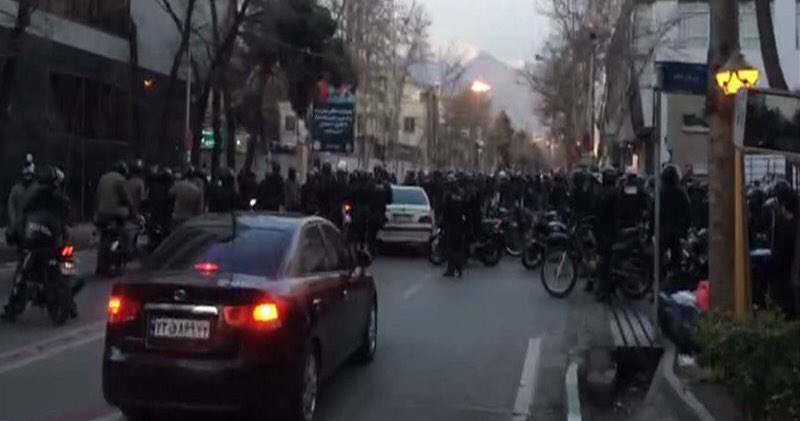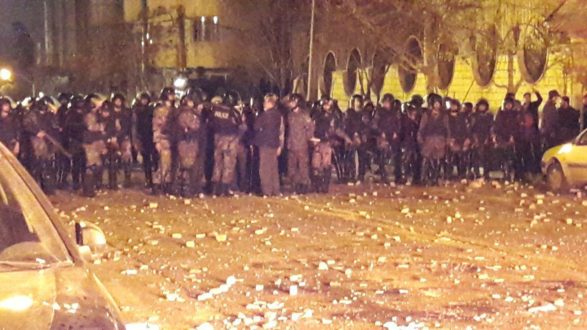CHRI – Approximately 170 members of the Sufi Gonabadi Order known in Iran as the Gonabadi Dervishes have been hospitalized in Tehran following clashes with the police and security forces, the Center for Human Rights in Iran (CHRI) has learned.

Two of them, Mohammad Labbaf and Nematollah Riahi, are in serious condition, the faith’s spokesman, Farhad Nouri, told CHRI on February 23, 2017.
The injured dervishes are being treated at Khatam ol Anbia, Sajjad, Imam Khomeini and Labbafinejad hospitals.
Another dervish, Amin Nouri, had a finger amputated after he was severely injured in the clashes. He and 29 other fellow Sufis were transferred on February 23 to the Great Tehran Penitentiary (GTP) in Fashafouyeh, 20 miles south of the capital, the group’s spokesman added.
Kasra Nouri, a student activist at the University of Tehran, Reza Entesari, a reporter, and Sekhavat Fahimi, occupation unknown, are among the other dervishes who were sent to the GTP following the clashes.
“When Kasra was detained, he received a blow to the head and broke his skull. He was in a coma for a while. His brothers, Amir and Pouria, were also arrested. Amir’s badly injured finger was amputated and he and about 30 other dervishes were taken from the hospital to prison in Fashafouyeh,” Farhad Nouri said.
He added: “The names of 300 dervishes detained in Tehran have been ascertained but it’s possible there are more. According to a list we have compiled, at least 10 women dervishes are among the detainees and they are being held in Gharchak Prison in Varamin [city]. Most of the men have been taken to GTP and some to Evin Prison.”
The Gonabadi spokesman continued: “The dervishes on 5th Golestan St. [in Tehran on February 19], were severely beaten by plainclothes agents. The police had pushed back and allowed the plainclothes agents to really beat them up as much as they could. Then the police came and arrested them. Most of them were injured and some of them needed special attention but as soon as they recovered a bit, they were bused to prison group by group.”
Conservative Friday Prayer Leaders Condemn Dervishes
Many Friday prayer leaders in provinces around the country, who were appointed to the position by Supreme Leader Ali Khamenei, condemned the dervishes in their sermons on February 23.
“First of all, they [dervishes] created this distraction so that the authorities wouldn’t have a chance to take care of the people’s economic issues,” said ultra-conservative Ayatollah Ahmad Alamolhoda, the Friday prayer leader of Mashhad, Iran’s second-largest city.
“On the other hand, they caused these riots to cover up the enemy’s espionage operations against our missile sites under the guise of environmental protection,” he added. “These [dervishes] must be uprooted for harming people’s security.”
The Friday prayer leader was building on the conspiracy theory recently aired in a state-funded TV program that accused Kavous Seyed-Emami, a prominent academic and environmentalist who died in state custody in Tehran, of engaging in espionage. Neither the program nor Alamolhoda provided evidence to support their claims.
In Qom Province, Friday Prayer Leader Mohammad Saeedi described the dervishes as “terrorists.”
“The recent seditious confrontations in Tehran were terrorist in nature. Some individuals calling themselves dervishes robbed the people of their peace and security with their Daesh-like antics,” declared Saeedi, referring to the ISIS terrorist group.
The ayatollah added, “The people expect the authorities to deal with these seditionists firmly and quickly. These recent riots in Tehran proved that seditionists don’t deserve Islamic mercy.”
In Tehran, Ayatollah Mohammad Ali Movahedi-Kermani said that the dervishes “who committed murder and destroyed people’s homes, shops and cars” must receive the stiffest punishments.
The prayer leaders blamed the dervishes for the violence but images posted on social media suggest that the clashes began after police fired bullets at dervishes who were demanding the release of one of their fellow devotees from a police station in Tehran on February 19.
The clashes took place near the home of the faith’s spiritual leader, Nour Ali Tabandeh, who on February 21 apologized to the families of three policemen and two members of the Basij volunteer militia who were killed allegedly by the protesting dervishes during the clashes.
The Gonabadi Dervishes’ interpretation of Islam differs from that of Iran’s ruling Muslim Shia establishment. The Islamic Republic views any alternative belief system, especially those seeking converts, as a threat to the prevailing Shia establishment and has imprisoned members of the Sufi order and expelled them from university for their faith.
 Shabtabnews In this dark night, I have lost my way – Arise from a corner, oh you the star of guidance.
Shabtabnews In this dark night, I have lost my way – Arise from a corner, oh you the star of guidance.



